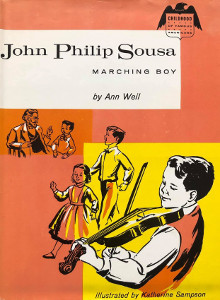John Philip Sousa: Marching Boy

Author:
Anne Weil
Illustrator:
Katherine Sampson
Publication:
1959 by Bobbs-Merrill Company
Genre:
Biography, Non-fiction
Series:
Childhood of Famous Americans (Authors and Composers)
Current state:
This book has been evaluated and information added. It has not been read and content considerations may not be complete.
Book Guide
Search for this book used on:
When John Philip Sousa was five years old, his father's friend, Mr. Esputa, offered to give him singing lessons. Philip was delighted, because, even as a small boy, he liked music—any kind of music. He was especially fond of melodies that made him feel like marching.
Philip took singing lessons from Mr. Esputa for several months. Then he went to a music school, which was run by Mr. Esputa's son John. Here he studied harmony, rhythm and sight reading.
While Philip was still very young, Mr. Sousa showed him a violin that Philip's grandfather had once played in Spain. He told Philip that someday he could have the violin for his own. Philip could hardly wait to learn to play it.
The opportunity came while Philip was attending John Esputa's music school. He began to take violin lessons from John Esputa and was an apt pupil. He became interested in other instruments, too, and taught himself to play several of them, including an alto horn.
When Philip was only ten years of age, he played with the Marine Band in a concert on the White House lawn. He was asked to play the alto horn because the regular player was ill. During the concert, he saw President Lincoln step quietly out of the White House to listen.
By now Philip wanted to become a musician, but he was interested in many things besides music. He liked to go hunting and to play baseball. He was one of the pitchers for The Navy Yard Boys. When he tried to pitch a game in the afternoon and play a violin solo in a concert that evening, he learned a lesson that he never forgot: Work and play don't mix.
Philip was born with a good ear for music and a fine sense of rhythm. Even so, he practiced hard every day, knowing that practice was necessary.
Like many children, Philip dreamed of joining a circus. At the age of thirteen his dream almost came true when a circus band leader offered him a job. Something happened, however, to enable him to join the noted Marine Band instead.
Years later John Philip Sousa became famous the world over as a band leader and composer. He wrote many marches, and was called "The March King."
This is one of several books that Ann Weil has written for the Childhood of Famous Americans Series. Others are Betsy Ross: Girl of Old Philadelphia; Franklin Roosevelt: Boy of the Four Freedoms; and John Quincy Adams; Boy Patriot.
From the dust jacket
To view an example page please sign in.
Content Guide
Please sign in to access all of the topics associated with this book and view other books with the same topics.
Please sign in to access the locations this book takes place in and view other books in the same location.
Please sign in to access the time periods this book takes place in and view other books in the same time period.
For information about the lead characters please sign in.
Find This Book
Search for this book used on:


